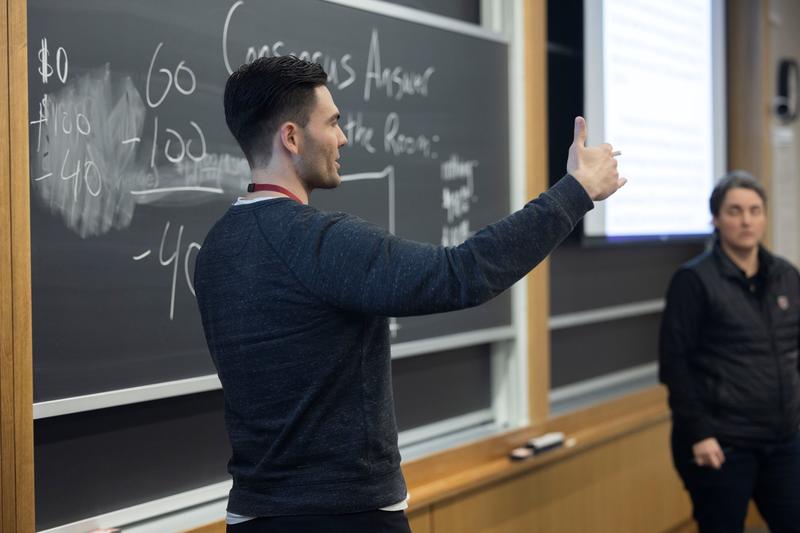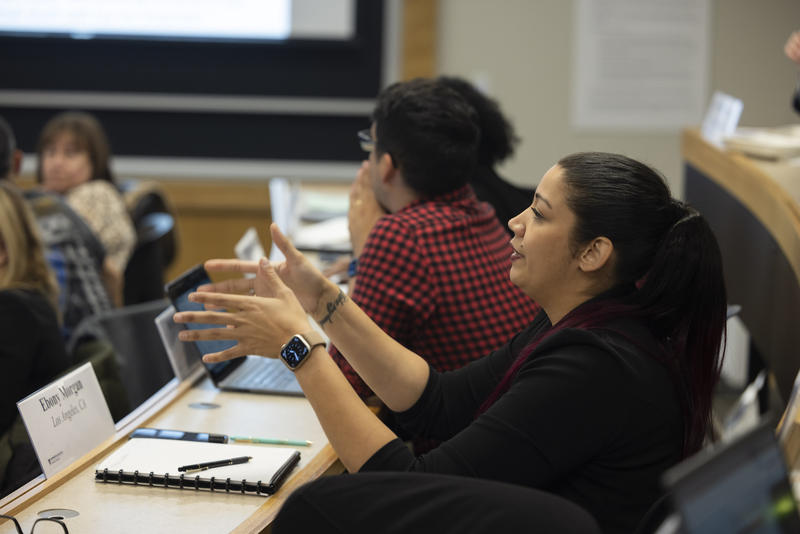
Strengthening Alternative 911 Emergency Response
In November, 47 representatives from 16 jurisdictions across the country gathered at the Harvard Kennedy School (HKS) for the inaugural HKS Government Performance Lab (GPL) and HKS Executive Education program “Driving Government Performance: Alternative Emergency Response.” Leaders from police and fire departments, 911 call centers, social service providers, and other agencies participated in five days of management and leadership training to advance their work on alternative emergency response.
The program was designed to facilitate intra- and cross-jurisdictional knowledge-sharing and relationship-building, and to expose alternative response leaders to a range of new management and leadership lessons they could bring to their programs. Topics included data-driven performance management, adaptive leadership, collaborative negotiation, coordinated crisis response, and change management. The week also included a discussion on how alternative emergency response can help strengthen democracy between GPL Executive Director Gloria Gong and Danielle Allen, the James Bryant Conant University Professor at Harvard University and Director of the Allen Lab for Democracy Renovation at Harvard Kennedy School’s Ash Center for Democratic Governance and Innovation.
Here are five of the key lessons from the week:

Data can inform a wide range of programmatic decisions, like when and where to deploy alternative response teams and which types of 911 calls to prioritize. Drawing on real-world examples in a wide range of contexts, Jeffrey Liebman, Robert W. Scrivner Professor of Social Policy at the Harvard Kennedy School, director of the Taubman Center for State and Local Government, and director of the GPL, offered participants a set of concrete approaches — such as asking operationally relevant questions, benchmarking, and thinking counterfactually — to better leverage data to drive decision-making in their home jurisdictions.
“We collect lots of data but sometimes we’re not sure what to do with it, what questions to ask. So, is data really driving our decisions? We’ve got a chance to do that with what we learned here.”
Johnathan Davis
Director, Baltimore Crisis Response, Inc.

Recognizing and responding to adaptive challenges can be a critical skill for alternative response leaders. Too often leaders treat problems as only technical in nature, failing to recognize that team members need to be engaged in the change management process so that they are committed to the new way of doing things. A session with Professor Liebman positioned participants to identify and start to address adaptive components of their challenges. For example, letting dispatchers directly see the benefits from connecting residents to alternative response can make them more willing to implement new dispatch protocols.
“After this week, we see how critical relationships and shared values are to moving systems change work along. The program provided strategic frameworks and tools for consensus-building and leading innovation, and I found relationships to be the common thread woven through the application of every module.”
Alanah Grant
Equity Officer, City of Long Beach

Alternative response programs typically involve a range of agencies, sometimes from multiple jurisdictions. Yet cross-agency coordination can be a significant challenge. Using a case study on crisis response after the 2013 Boston Marathon bombing, Dutch Leonard, Eliot I. Snider and Family Professor of Business Administration at the Harvard Business School and the George F. Baker, Jr. Professor of Public Sector Management at the Harvard Kennedy School, helped participants and their jurisdictional partners recognize the value of advance planning around coordination and communication protocols. This included identifying current strengths and finding opportunities to improve cross-agency coordination processes as they work to maintain safe, reliable, and nimble emergency response systems.
“I was typically only talking to my counterpart at the city community safety department every other week. We’ve heard from other jurisdictions that they talk much more frequently, and we’re going to open up those lines of communications.”
Roshanna Parker
Director, Durham County Justice Services Department

For many alternative response leaders, the ability to navigate complex negotiations can help them strengthen the sustainability and scale of the program. To that end, participants learned strategies for collaborative and multiparty negotiations – which can be applied in both formal and informal settings. With guidance from Rob Wilkinson, senior lecturer in public policy and leadership at the Harvard Kennedy School, and Anselm Dannecker, senior fellow at the Negotiation and Conflict Resolution Collaboratory at the Harvard Kennedy School Center for Public Leadership, participants came away with a deeper understanding of how to leverage interest-driven negotiation skills to secure new resources and cultivate buy-in among key stakeholders.
“We heard a few times how important it was to start with being clear about the outcome you want, and to work backwards from there. When I get back to Phoenix, one action I want to take is to talk with each stakeholder and make sure we’re all going for the same outcome.”
Benjamin Santillan
Deputy Chief, Phoenix Fire Department

Launching an alternative response program often requires addressing competing commitments. For example, an agency leader may be committed to both implementing an effective alternative emergency response program and insulating their agency from risk. Kim Leary, associate professor in the Department of Health Policy and Management at the Harvard T.H. Chan School of Public Health, associate professor of psychology at the Harvard Medical School, and senior fellow at the Bloomberg Center for Cities at Harvard University, helped participants start to identify underlying assumptions that fuel their competing commitments and test those assumptions.
“I’m going to take this exercise back to my team and say this is what we need to talk about — competing commitments are what we don’t talk about enough.”
Heather McGaffin
Director, Office of Unified Communications, Washington, D.C.
Through the GPL’s Alternative 911 Emergency Response Implementation Cohort, jurisdictions that participated in the program will continue to receive individualized applied research support and technical assistance from GPL staff. Before returning to their jurisdictions, participants reflected on how they plan to leverage the skills learned and relationships built during the program:
One thing I’ve learned from my peers is how many are working directly with the 988 crisis line. I want to go back to Harris County and see how we can work with the 988 crisis line to get those dispatches directly to our teams. We need to ensure we’re reaching people in need who are not contacting our 911 centers.Kathi Yost
Director of Operations, DEMA Consulting & Management, Harris County, TX
If your jurisdiction is exploring, planning, implementing, or expanding alternative 911 emergency response teams, consider joining the GPL’s Alternative 911 Emergency Response Community of Practice. Designed exclusively for government staff, the community of practice provides representatives from over 80 governments across the country with practical tools and actionable insights emerging from the GPL’s alternative 911 emergency response work and research. The community of practice convenes monthly, providing a space for participants to engage with government peers on topics such as team training, community outreach, and scaling and expanding pilot programs. Learn more about the Community of Practice here.
Strengthening Alternative 911 Emergency Response
Strengthening Alternative 911 Emergency Response
Strengthening Alternative 911 Emergency Response
Strengthening Alternative 911 Emergency Response
Strengthening Alternative 911 Emergency Response
Strengthening Alternative 911 Emergency Response


